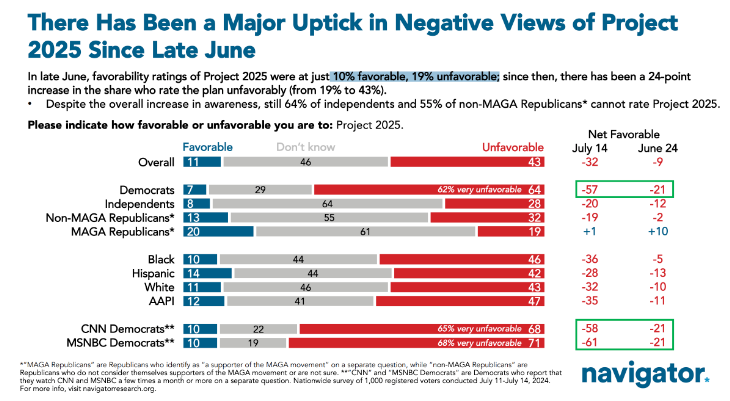
New polling from Navigator Research shows a rapid increase in the number of Americans who say they have heard of Project 2025, the Heritage Foundation’s authoritarian plan for a second Donald Trump administration. And along with that awareness has also come a sharp increase in the number of Americans who disapprove of it.
Though articles about the plan have been circulating since the middle of 2023, a Navigator survey at the end of June showed just 10% of Americans holding a favorable opinion of Project 2025 and 19% holding an unfavorable opinion. The rest had either no opinion or no knowledge of the plan.
But by mid-July, those numbers had jumped to 11% favorable and 43% unfavorable. That increase in knowledge about the plan reflects broader reporting on Project 2025, as well as increased attention to the plan from Democratic politicians. It also likely reflects a spurt of media coverage that began in early July expressly because Trump claimed to be unfamiliar with the plan.

Project 2025, produced with the assistance of at least 140 former or current members of Trump’s campaign and White House staff, is meant to act as a guide to Trump’s actions in a second term.
While Project 2025 has gathered notoriety in political circles for many months, including at Daily Kos, Navigator’s findings in late June show the general public had relatively little awareness of the plan.
A number of factors helped turn that around. In May, Rep. Ayanna Pressley posted a widely seen video on TikTok detailing the plan’s desire to eliminate the Department of Education, among other goals. On June 11, Democratic lawmakers formed the Stop Project 2025 Task Force, releasing an announcement that warned against the plan as “dystopian.”
Then, on June 20, HBO’s “Last Week Tonight with John Oliver” made Project 2025 the central topic of the program.
A week later, President Joe Biden launched a website focused on publicizing the contents of Project 2025.
On June 30, BET Awards host Taraji P. Henson warned those tuning in to the broadcast about Project 2025. “Pay attention,” Henson told the audience. “It’s not a secret, look it up. They are attacking our most vulnerable citizens. The Project 2025 plan is not a game. Look it up!”
All of those factors generated interest, but the turning point in making the plan for an authoritarian takeover of the federal government more visible to the general public might have taken place on July 5, when Trump denied any knowledge of the plan.

Trump’s response was so obviously false, that multiple media outlets published responses to that denial, several of which included details about the contents of the plan. By July 11, it seemed like discussion of Project 2025 was everywhere.
While many of the actions proposed in the plan, like changing the status of federal workers to make it easier to insert Trump followers into critical positions, are not easily perceived as threats by the public, other parts of the manifesto are more clearly objectionable. That includes a tax plan that would cost working-class and middle-class families thousands while generating huge savings for the wealthy.

Trump may be denying involvement, but polling shows his false claims aren’t being believed.
People are learning about Project 2025. They know it describes Trump’s plans for when he retakes the White House. And they don’t like it.



